Unit 1.1
2023-2024学年仁爱版英语七上同步教学 Unit 1

Finish the blanks
• You__a_re___ pretty. • You__a_re___ great!
• 特殊记忆:I 和you. I后面只能用am, you是“你, 你们”的意思,不管做哪种意思讲,不考虑主 语是单数还是复数,一律跟be动词are搭配。
Sum up
问候 Good morning. Good afternoon. How are you? I’m fine, thank you. And you?
Hi, Snoopy! I am Cindy. I am ten years old. I am a student.
I am a girl. 句型解析:I am+… 启示:第一人称单数( I )配合 am来用。
You are my good friend. You are a good student. You are happy.
A: Good afternoon, Jim. B: Good afternoon, Nashi. How are you? A: I am fine, thanks. And you? A: I am fine, too.
Hello! I am Snoopy. I am five years old. I am a dog.
Good evening!
Good evening!
/ ˈiːvnɪŋ /
18:00
Good evening用于傍晚之后到睡觉前
不同时间段的问候方式
早上好 Good morning!
下午好 Good afternoon!
晚上好 Good evening!
【注意】 Good evening为晚上好,多用于傍晚之后见面时的问候; Good night为晚安,是临睡前和晚上道别时用的。
Unit 1 1.1 Reading and thinking高一英语(人教版2019必修第二册)

protection of cultural sites can be a big challenge. B.A committee was established to limit
Para.3 Para.4
damage. C.The proposal leads to protests. D.The project brought governments and
countless cultural relics were taken down piece by piece,moved and put
back together again in a place where they were safe 7. from the water.The project was considered 8. a great success.It's believed that it was possible for different countries 9. to work (work) together to build a
protest, turn to 2._U__N_, a
分
committee, work
helpful
together, success
spirit, best example,
global 3._c_o_m_m__u_n_i_ty_,
provide a solution
happy/sati 总 sfied
was because the new dam would 2. likely (like) destroy many cultural relics.Then the government 3. established (establish) a committee to find a solution to the 4. protection (protect) of Egypt's cultural heritage.After a proposal for how the relics could 5. be saved (save) was made,the project began in 1960 and ended in 1980.During those years,22 temples 6.__a_n_d_
英语初三上仁爱湘教版unit1.1单词解析
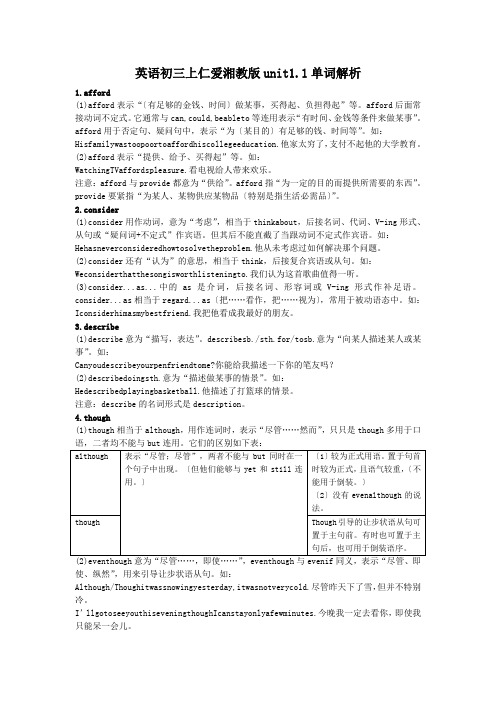
英语初三上仁爱湘教版unit1.1单词解析1.afford(1)afford表示“〔有足够的金钱、时间〕做某事,买得起、负担得起”等。
afford后面常接动词不定式。
它通常与can,could,beableto等连用表示“有时间、金钱等条件来做某事”。
afford用于否定句、疑问句中,表示“为〔某目的〕有足够的钱、时间等”。
如:Hisfamilywastoopoortoaffordhiscollegeeducation.他家太穷了,支付不起他的大学教育。
(2)afford表示“提供、给予、买得起”等。
如:WatchingTVaffordspleasure.看电视给人带来欢乐。
注意:afford与provide都意为“供给”。
afford指“为一定的目的而提供所需要的东西”。
provide要紧指“为某人、某物供应某物品〔特别是指生活必需品〕”。
2.consider(1)consider用作动词,意为“考虑”,相当于thinkabout,后接名词、代词、V-ing形式、从句或“疑问词+不定式”作宾语。
但其后不能直截了当跟动词不定式作宾语。
如:Hehasneverconsideredhowtosolvetheproblem.他从未考虑过如何解决那个问题。
(2)consider还有“认为”的意思,相当于think,后接复合宾语或从句。
如:Weconsiderthatthesongisworthlisteningto.我们认为这首歌曲值得一听。
(3)consider...as...中的as是介词,后接名词、形容词或V-ing形式作补足语。
consider...as相当于regard...as〔把……看作,把……视为〕,常用于被动语态中。
如:Iconsiderhimasmybestfriend.我把他看成我最好的朋友。
3.describe(1)describe意为“描写,表达”。
describesb./sth.for/tosb.意为“向某人描述某人或某事”。
2019-2020学年新外研版高一英语课时教案:必修1 Unit 1 1.1 Starting out教学设计(1)
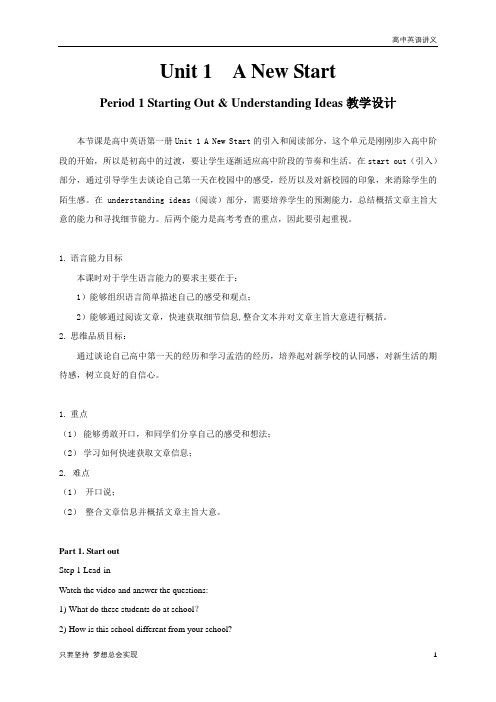
Unit 1 A New StartPeriod 1 Starting Out & Understanding Ideas教学设计本节课是高中英语第一册Unit 1 A New Start的引入和阅读部分,这个单元是刚刚步入高中阶段的开始,所以是初高中的过渡,要让学生逐渐适应高中阶段的节奏和生活。
在start out(引入)部分,通过引导学生去谈论自己第一天在校园中的感受,经历以及对新校园的印象,来消除学生的陌生感。
在understanding ideas(阅读)部分,需要培养学生的预测能力,总结概括文章主旨大意的能力和寻找细节能力。
后两个能力是高考考查的重点,因此要引起重视。
1.语言能力目标本课时对于学生语言能力的要求主要在于:1)能够组织语言简单描述自己的感受和观点;2)能够通过阅读文章,快速获取细节信息,整合文本并对文章主旨大意进行概括。
2.思维品质目标:通过谈论自己高中第一天的经历和学习孟浩的经历,培养起对新学校的认同感,对新生活的期待感,树立良好的自信心。
1.重点(1)能够勇敢开口,和同学们分享自己的感受和想法;(2)学习如何快速获取文章信息;2. 难点(1)开口说;(2)整合文章信息并概括文章主旨大意。
Part 1. Start outStep 1 Lead-inWatch the video and answer the questions:1)What do these students do at school?2)How is this school different from your school?Step 2 Questionnaire1)Ask students to finish the questionnaire by themselves;2)Ask students to share their answers with classmates.Tips:For the first question, students can express themselves like this:On my first day at senior high, I felt very excited/happy/nervous... because...For the forth question, students can express themselves like this:About my new school, I like the campus/my teachers/my classmates...most because...Part 2. Understanding ideasStep 1. Activity 1 & 2 on page 2.Look at the title of the passage and the pictures. Tick what you think is mentioned in the passage.The school campusA new teacherSchool subjectsA new timetableAn embarrassing momentNew friendsTips:Some students may think all of the subjects above will be mentioned in the passage, but after reading, they will find just No 1, 2 and 5 are mentioned. But it doesn’t matters.Step 2. Activity 4 on page 4.Task 1. Complete Meng Hao’s experiences with expressions from the passage.Task 2. Find expressions from the passage that show Meng Hao’s feelings at each stage of the day.Tips:Task 1 requires students to find information from the passage quickly and Task 2 requires students to find and integrate information.For task 2, students should use some adjectives to describe Meng Hao’s feelings, then find some detailed information to support.Step 3. Activity 3 on page 4.Choose the best description of Meng Hao’s first day at senior high.Tips:This is about the main idea of the passage.Step 4. What’s your understanding of the saying “Well begun, half done”?Step 5. What happened on your first day at senior high? What do you think of your experiences? Share your experiences with the class.Step 6. Homework.。
新视野英语教程第一册课后翻译答案
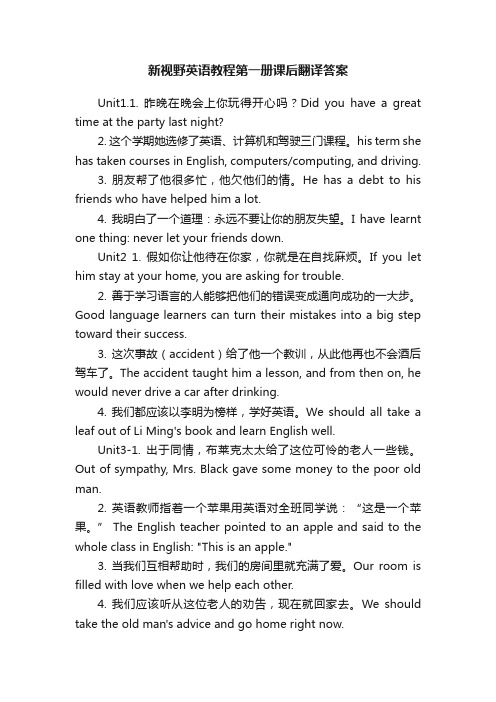
新视野英语教程第一册课后翻译答案Unit1.1. 昨晚在晚会上你玩得开心吗?Did you have a great time at the party last night?2. 这个学期她选修了英语、计算机和驾驶三门课程。
his term she has taken courses in English, computers/computing, and driving.3. 朋友帮了他很多忙,他欠他们的情。
He has a debt to his friends who have helped him a lot.4. 我明白了一个道理:永远不要让你的朋友失望。
I have learnt one thing: never let your friends down.Unit2 1. 假如你让他待在你家,你就是在自找麻烦。
If you let him stay at your home, you are asking for trouble.2. 善于学习语言的人能够把他们的错误变成通向成功的一大步。
Good language learners can turn their mistakes into a big step toward their success.3. 这次事故(accident)给了他一个教训,从此他再也不会酒后驾车了。
The accident taught him a lesson, and from then on, he would never drive a car after drinking.4. 我们都应该以李明为榜样,学好英语。
We should all take a leaf out of Li Ming's book and learn English well.Unit3-1. 出于同情,布莱克太太给了这位可怜的老人一些钱。
Out of sympathy, Mrs. Black gave some money to the poor old man.2. 英语教师指着一个苹果用英语对全班同学说:“这是一个苹果。
_2020年高中英语外研版一轮复习综合素质提升教案:必修1 Unit 1 1.1 Starting out 教学设计(2)
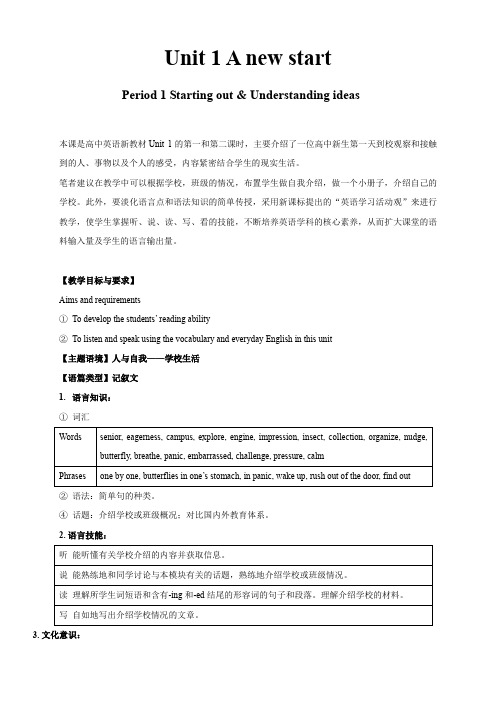
Unit 1 A new startPeriod 1 Starting out & Understanding ideas本课是高中英语新教材Unit 1的第一和第二课时,主要介绍了一位高中新生第一天到校观察和接触到的人、事物以及个人的感受,内容紧密结合学生的现实生活。
笔者建议在教学中可以根据学校,班级的情况,布置学生做自我介绍,做一个小册子,介绍自己的学校。
此外,要淡化语言点和语法知识的简单传授,采用新课标提出的“英语学习活动观”来进行教学,使学生掌握听、说、读、写、看的技能,不断培养英语学科的核心素养,从而扩大课堂的语料输入量及学生的语言输出量。
【教学目标与要求】Aims and requirements①To develop the students’ reading ability②To listen and speak using the vocabulary and everyday English in this unit【主题语境】人与自我——学校生活【语篇类型】记叙文1. 语言知识:①词汇Words senior, eagerness, campus, explore, engine, impression, insect, collection, organize, nudge, butterfly, breathe, panic, embarrassed, challenge, pressure, calmPhrases one by one, butterflies in one’s stomach, in panic, wake up, rush out of the door, find out②语法:简单句的种类。
④话题:介绍学校或班级概况;对比国内外教育体系。
2. 语言技能:听能听懂有关学校介绍的内容并获取信息。
说能熟练地和同学讨论与本模块有关的话题,熟练地介绍学校或班级情况。
2019-2020学年新外研版高一英语单元测验:必修1 Unit 1 1.1 Starting o
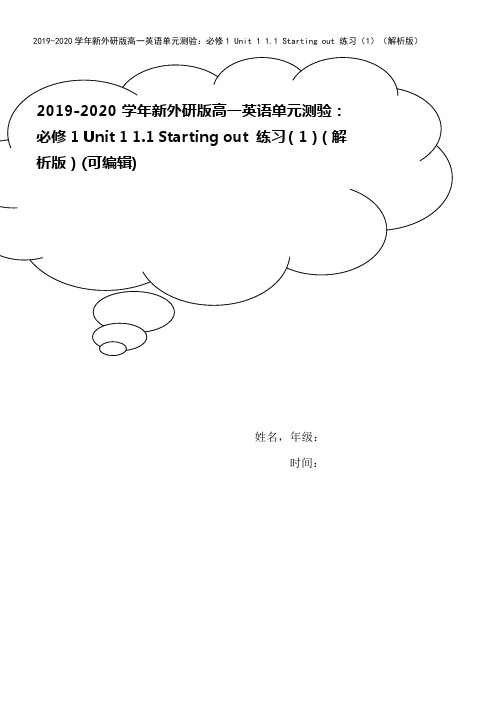
姓名,年级:时间:Unit 1 A New StartPeriod 1 Starting Out & Understanding Ideas 练习Part 1 单词拼写或者填入适当单词1.Do as the chemistry teacher has told you in e______________.2.The land is untouched and has a lot to e__________ and enjoy.3.Have more c_____________ and you will succeed in time。
4.What's your i___________of your high school after the first day?5.I was so hungry that I couldn’t c__________ on my class in the last 5 minutes.6.S________ high school is a little different from junior high school。
7.The boy was not quite confident _____ himself, which accounts for his failure in the exam8.The judges were quite i__________ by the singer’s voice in the live show.9.He felt a___________ when he made such a stupid mistake.10.What happened ______ you was not uncommon。
【答案】1.experiment(s) 2。
explore 3。
confidence 4。
(冀教版)六年级英语下册 《unit1 Lesson1》说课稿3
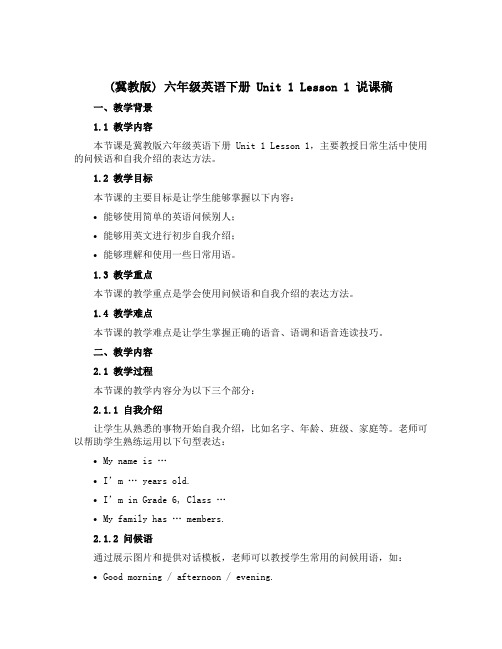
(冀教版) 六年级英语下册 Unit 1 Lesson 1 说课稿一、教学背景1.1 教学内容本节课是冀教版六年级英语下册 Unit 1 Lesson 1,主要教授日常生活中使用的问候语和自我介绍的表达方法。
1.2 教学目标本节课的主要目标是让学生能够掌握以下内容:•能够使用简单的英语问候别人;•能够用英文进行初步自我介绍;•能够理解和使用一些日常用语。
1.3 教学重点本节课的教学重点是学会使用问候语和自我介绍的表达方法。
1.4 教学难点本节课的教学难点是让学生掌握正确的语音、语调和语音连读技巧。
二、教学内容2.1 教学过程本节课的教学内容分为以下三个部分:2.1.1 自我介绍让学生从熟悉的事物开始自我介绍,比如名字、年龄、班级、家庭等。
老师可以帮助学生熟练运用以下句型表达:•My name is …•I’m … years old.•I’m in Grade 6, Class …•My family has … members.2.1.2 问候语通过展示图片和提供对话模板,老师可以教授学生常用的问候用语,如:•Good morning / afternoon / evening.•How are you?•I’m fine, thank you. And you?•Nice to meet you.2.1.3 常用语老师也可以辅助学习常用的简单英语表达,包括:•Can I help you?•Excuse me.•Sorry.•Please.•Thank you.2.2 课堂展示本节课的课堂展示可参照以下形式:2.2.1 读音练习让学生听录音和模仿英文问候语的正确语音和语调。
2.2.2 分角色练习老师选演员和配角,通过角色扮演的方式演示日常生活中的对话,并引导学生参与其中。
2.2.3 班级讲解将学生分成小组,每个小组讲解一个自我介绍的模板,让其他同学跟随学习。
三、教学评价3.1 学生评价学生能否在课堂上积极参与讨论、模仿英文问候语和自我介绍。
Unit_1(1)词汇学

Unit_1(1)词汇学Objectives :1. Learn the scientific definition of the word;2. Understand the arbitrary and conventional relationship between sound andmeaning;3. Remember the four factors that cause the differences between sound and form;4. Understand the relationship between words and vocabulary.Main points:WordSound and MeaningSound and FormV ocabularyUnit 11.1 What is a word?What is a word? This question has occupied the attention of linguists for ages. Although numerous definitions have been suggested, none of them seem to be perfect. Scholars still do not agree on the definition of the word.When we talk about a word, we tend to think in visual terms. In this line a word can be defined as a meaningful group of letters printed or written horizontally across a piece of paper. As defined in terms of spoken language, a word is viewed as a sound or combination of sounds which are made voluntarily with human vocal equipment. According to semanticists , a word is a unit of meaning. Grammarians , however, insist that a word be a free form that can function in a sentence, etc. To sum up, the definition of a word comprises the following points:(1) a minimal free form of a language;(2) a sound unity;(3) a unit of meaning;(4) a form that can function alone in a sentence.Therefore, we can say that 'a word is a minimal free form of a language that has a given sound and meaning and syntactic function.'Words can be simple and complex, yet all must comply with these criteria. Man and fine are simple, but they each have sound, meaning and syntactic function, and each can be used alone in a sentence. Naturally they are words. There are words which are complex such as mis.for.tune and man.age.ment. Both are polysyllabic words and can function as 'subject', 'object' and 'predictive' in a sentence. Though misfortune can be further divided as mis- and fortune, the former cannot stand aloneas a word. Similarly, management can be broken down as manage and -ment, the latter cannot be used freely, either. Blackmail can be separated into black and mail, and both can work as independent units in a sentence, the meaning of each, however, is by no means the combination of the two. Black is a colour, opposite to 'white', and mail denotes 'something sent by post', yet when they are put together, the combined form means 'compel, compulsion, to make payment or action for concealment of discreditable secrets etc.' Hence blackmail is a different word.1.2 Sound and MeaningA word is a symbol that stands for something else in the world. Each of the world's cultures has come to agree that certain sounds will represent certain persons, things, places, properties, processes and activities outside the language system. This symbolic connection is almost always arbitrary, and there is 'no logical relationship between the sound which stands for a thing or an idea and the actual thing and idea itself'. A dog is called a dog not because the sound and the three letters thatmake up the word just automatically suggest the animal in question. It is only symbolic. The relationship between them is conventional because people of the same speech community have agreed to refer to the animal with this cluster of sounds. In different languages the same concept can be represented by different sounds. Woman, for example, becomes Frau in German, femme in French and fùn? in Chinese. On the other hand, the same sound [mi:t] is used to mean meet, meat, mete. Knight and night, though denoting entirely different things, yet have the same sound.1.3 Sound and FormIt is generally agreed that the written form of a natural language is the written record of the oral form. Naturally the written form should agree with the oral form. In other words, the sound should be similar to the form. This is fairly true of English in its earliest stage i.e. Old English. The speech of the time was represented very much more faithfully in writing than it is today. With the development of the language, more and more differences occur between the two. The internal reason for this is that the English alphabet was adopted from the Romans, which does not have a separate letter to represent each sound in the language so that some letters must do double duty or work together in combination.Another reason is that the pronunciation has changed more rapidly than spelling over the years, and in some cases the two have drawn far apart. During the last five hundred years, though the sounds of speech have changed considerably, there have been no corresponding changes of spelling.A third reason is that some of the differences were created by the early scribes. In the early days the spelling differences did not matter very much as people were not so used to seeing words in print, and the spelling was not fixed as it is today. As a result, no one was quite sure how some English words should be spelled. Sometimes, people deliberately changed spelling of words either to make a line even or for easier recognition. Before the printing press was brought to England, everything was written by hand. Those scribes, who made a living by writing for other people often workedin haste to meet the needs of the King, Church, and merchants. One problem was that several letters written with short vertical strokes such as i, u, v, m, w and n looked all alike. Consequently, their handwriting caused misunderstanding. To solve the problem in part, they changed the letter u to o when it came before m, n, or v. This is how sum, cum, wuman, wunder, munk came to be written as some, come, woman, wonder, monk. At some point, too, the scribes seem to have decided that no English word should end in u or v. Thus, in time, an e was added to such words as live, have, due, and true but not pronounced.In the late 1500, printing became well established. It helped to freeze the spelling of words. The standardization makes spelling sacred. Dictionaries did their share in stopping spelling changes. Meanwhile, sounds continued to change as usual, thus bringing more differences.Finally comes the borrowing, which is an important channel of enriching the English vocabulary. When English borrowed words from other languages, it borrowed spelling as well. The early borrowings were assimilated and the later ones, however, do not conform to the rules of English pronunciation and spelling, e.g. stimulus (L), dénouement (F), fiesta (Sp), eureka(Gr), and kimono(Jap).The written form of English is, therefore, an imperfect representation of the spoken form. From time to time in history, some British and American scholars have made efforts to reform the English spelling, but with little success. In spite of the differences, at least eighty percent of the English words fit consistent spelling patterns. And even those spellings that appear to be irregular may have more regularity and usefulness than we realize. In such words as hymn, condemn, bomb, for example, the last letter of each is silent. But when these words are extended into longer ones, the silent letters become audible: hymnal, condemnation and bombard. This is a general rule.1.4 V ocabularyAll the words in a language make up its vocabulary. The term 'vocabulary' is used in different senses. Not only can it refer to the total number of the words in a language, but it can stand for all the words used in a particular historical period, e.g. Old English vocabulary, Middle English vocabulary and Modern English vocabulary. We also use it to refer to all the words of a given dialect, a given book, a given discipline and the words possessed by an individual person. English is one of the world's highly developed languages. Naturally the vocabulary is one of the largest and richest. The general estimate of the present-day English vocabulary is over one million words.Exercise:Which of the following is NOT true?A. A word is the smallest form of a language.B. A word is a sound unity.C. A word has a given meaning.D. A word can be used freely in a sentence.Answer ADecide whether the following are true or false.1. A word can be defined in different ways from different points of view.2. Under no circumstances can sound and meaning be logically related.3. The introduction of printing press resulted in a lot more differences between sound and form.4. The words a person can use in speaking and writing form his active vocabulary. Answer 1. T 2. F 3. T 4. TWhat is vocabulary?Answer V ocabulary is most commonly used to refer to the sum total of all the words of a language. It can also refer to all the words of a given dialect, a given book, a given subject and all the words possessed by an individual person as well as all the words current in a particular period of time in history.Explain the relationship between sound and meaning with examples.Answer Sound is the physical aspect of a word and meaning is what the sound refers to. Sound and meaning are not intrinsically related and their connection is arbitrary and conventional. For example, tree /tri:/ to 树in Englisn because the English-speaking people have agreed to do so just as Chinese people use /sh?/ to refer to the same thing. This explains why people of different languages use different sound to express the same concept. Even I the same language, the same sound can have different meanings e.g. /rait/ can mean right, rite and write.。
人教版五年级英语上册先学后教带录音Unit1.1
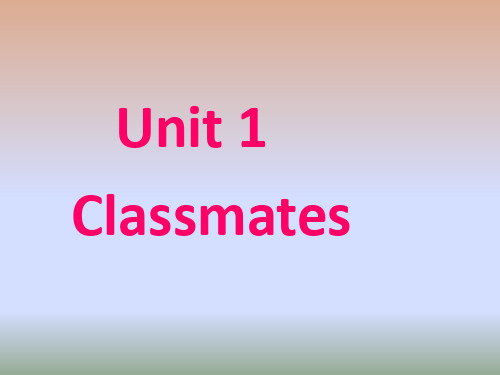
Have a match !
(比一比,谁能准确、流利地朗读课文; 谁能认真倾听,并及时发现错误!)
Please read the text again and answer these question:
1. What’s Tom like ? 2. What is the dog doing ? 3. What can you see in the room ? 4. Is it the Tom’s birthday ?
Please read the text by yourself within 3 minutes .
大声朗读课文 (若有疑难,请 举手示意。)
Read
after the tape !
跟录音,读课文。 (注意语音语调)
Please read with your group.
两人一组,互读课文。
Please recite the key sentences by yourself within 5 minutes.
大声背重点句子 (5分钟后,教师提问)
Practice
C: Let’s write!
Unit 1 Classmates
Learning aims:
1. I can read and understand the text. (会读并理解课文) 2. I can recite the key sentences. (会背重点句子)
Look, listen and point !
(看图,看录音,注意语调和语速)
Please read the text again and find out these sentences. Then try to read these sentences 3 mithe best one ! (读课文,找出以下句子。)
2023-2024学年仁爱版英语七上同步教学 Unit 1

1. Make an English name card for yourself. 2. Make more friends and exchange your name cards. 3. Make sure to master the English letters A—Z.
Good-bye!
Nice to see you.
_N__ic_e_t_o_s_e_e_y_o_u_,_t_o_o_.
How are you? _F_i_n_e_, _th_a_n_k_s_. And you?
I’m__O_K__.
Dad, this is Miss Wang. Miss Wang, this is my dad.
Unit 1.1 Section D
Look at the pictures and complete the conversations.
Hello! I am Kangkang. ___A_r_e_y_o_u____ Nacy?
No, I_a_m__Lily.
__G_o_o_d_m__o_rn_i_n_g_, Good morning, Kangkang! Miss Wang!
Yes, he is
Is he Zhong Nanshan?
Guess Who is she?
She is famous on the internet. She is young. She lives in a beautiful place .
No, she is not =No,she isn’t
具体如下: 1.am的主语是I。如:I am Kangkang. 2.are 的主语是第二人称或是复数人称。如:Are you Jane? 3.is 的主语是第三人称单数。如:This is Ms. Jones.
unit1.1-7
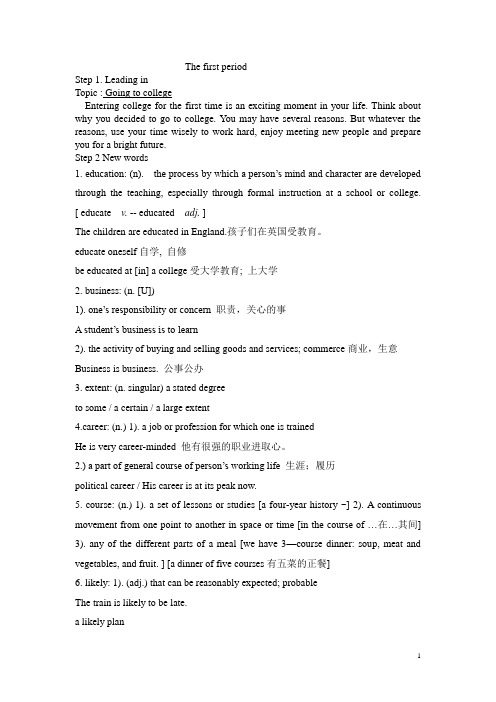
The first periodStep 1. Leading inTopic : Going to collegeEntering college for the first time is an exciting moment in your life. Think about why you decided to go to college. You may have several reasons. But whatever the reasons, use your time wisely to work hard, enjoy meeting new people and prepare you for a bright future.Step 2 New words1. education: (n). the process by which a person’s mind and character are developed through the teaching, especially through formal instruction at a school or college. [ educate v. -- educated adj. ]The children are educated in England.孩子们在英国受教育。
educate oneself自学, 自修be educated at [in] a college受大学教育; 上大学2. business: (n. [U])1). one’s responsibility or concern 职责,关心的事A student’s business is to learn2). the activity of buying and selling goods and services; commerce商业,生意Business is business. 公事公办3. extent: (n. singular) a stated degreeto some / a certain / a large extent4.career: (n.) 1). a job or profession for which one is trainedHe is very career-minded 他有很强的职业进取心。
unit1.1
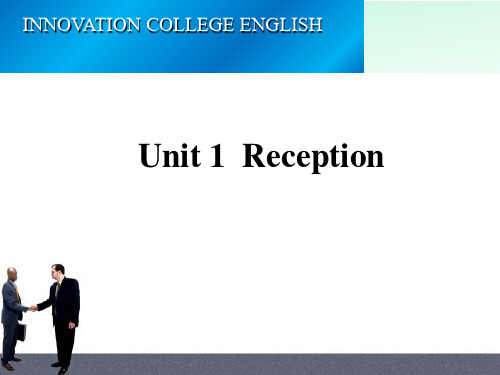
2. In which country do business people seldom address others by academic titles?
3. In which country are you supposed to wave people goodbye with the back of the hands facing them?
7. In which country should flowers as gifts for ladies be an odd number?
HOME
Unit Task Reading LSW
Portfolio
HOME
Unit Task
Reading
LSW
Learning for fun
Listen to the story and then retell it in class.
Script
HOME
Unit Task
Reading
LSW
Learning for fun Script
A sales rep, an administrative clerk and their manager are walking to lunch when they find an antique oil lamp. They rub it and a Genie comes out in a puff of smoke. The Genie says, “I usually only grant three wishes, so I'll give each of you just one.” “Me first! Me first!” says the clerk. “I want to be in the Bahamas, driving a speedboat, without a care in the world.” Poof! She's gone. In astonishment, “Me next! Me next!” says the sales rep. “I want to be in Hawaii, relaxing on the beach with my personal masseuse, an endless supply of pina coladas and the love of my life.” Poof! He’s gone. “OK, you’re up,” the Genie says to the manager. “I want those two back in the office after lunch.”
Unit 1.1 lan &lan ts
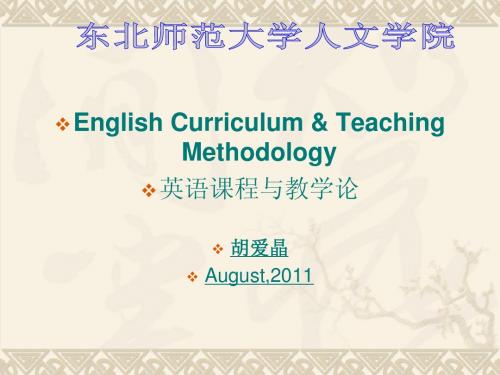
Contents:
Unit 4 Teaching the lan system and skills Unit 5.1 Historical overview of English teaching methods Unit 5.2 Communicative teaching approach Unit 6.1 Lesson planning Unit 6.2 Classroom management Unit 7 Assessment in LT & reflection Unit 8 Using CALL& teaching resources
1. When did you start learning English? 2. How do you feel about learning a foreign lan? 3. Which skills do you find more difficult to learn?
4. Do you consider yourself a successful learner?
Structural view
Teaching English is to teach _____________________ which include: linguistic structural items
Phonological units Grammatical units (clauses ,phrases, sentences) Grammatical operations Lexical items (syntax) (sound system)
Contents:
Unit 1.1 The nature of language Unit1.2 The nature of language teachers’ development Unit 2.1 Language learning theories and learners Unit 2.2 Interlanguage Unit 2.3 Krashen & his theories Unit 2.4 Learners differences Unit 3.1 National English Curriculum Unit 3.2 NEC & evaluating coursebooks
八年级下册英语unit1-unit10课文翻译

八年级下册英语unit1-unit10课文翻译Unit 1:1.1 The Best Summer Ever- 最美好的夏天1.2 How Do You Study for a Test?- 你是如何备考的?1.3 People all over the world enjoy sports- 全世界的人们都喜欢运动1.4 I used to be afraid of the dark- 我过去害怕黑暗1.5 Do you want to watch a game show?- 你想看游戏节目吗?Unit 2:2.1 Schooldays around the world- 全世界的校园生活2.2 What's your favorite subject?- 你最喜欢的科目是什么?2.3 What were you doing when the rainstorm came? - 当暴风雨来临时,你正在做什么?2.4 Life on Earth is in danger- 地球上的生命正处于危险之中2.5 What's the matter with you?- 你怎么了?Unit 3:3.1 How do you read a poem?- 你是如何阅读诗歌的?3.2 Foreign food- 外国食物3.3 The Million Pound Bank Note- 一百万英镑的钞票3.4 A life in the day of ...- 一天的生活...3.5 Have you read Treasure Island?- 你读过《金银岛》吗?Unit 4:4.1 Don't eat in class- 不要在课堂上吃东西4.2 What should I do?- 我应该怎么办?4.3 Fun with English- 英语趣味学习4.4 A true story- 一个真实的故事4.5 Welcome to the unit- 欢迎来到本单元Unit 5:5.1 I used to have a pen pal- 我过去有一个笔友5.2 We're trying to save the Earth - 我们正在努力拯救地球5.3 The world around us- 我们周围的世界5.4 He's a famous Chinese scientist - 他是一位著名的中国科学家5.5 What are you doing for vacation? - 你假期打算做些什么?。
金老师教育培训人教版英语八年级上册Starter Unit 1.1 Where did you go
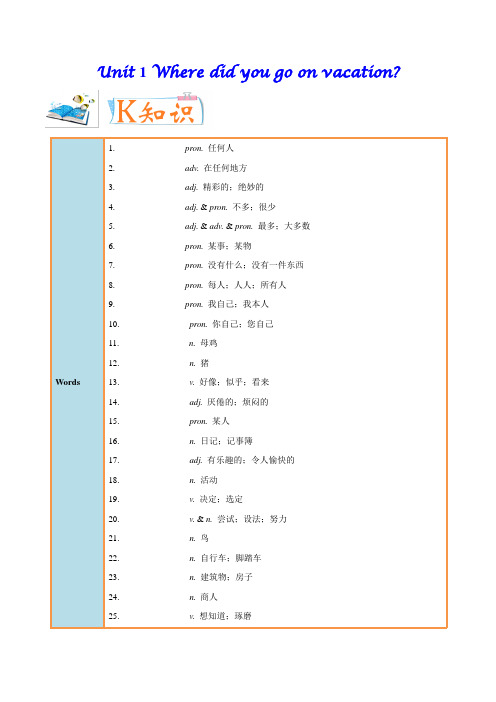
Unit 1 Where did you go on vacation?Words 1. _______________ pron.任何人2. _______________ adv.在任何地方3. _______________ adj.精彩的;绝妙的4. _______________ adj. & pron.不多;很少5. _______________ adj. & adv. & pron.最多;大多数6. _______________ pron.某事;某物7. _______________ pron.没有什么;没有一件东西8. _______________ pron.每人;人人;所有人9. _______________ pron.我自己;我本人10. _______________ pron.你自己;您自己11. _______________ n.母鸡12. _______________ n.猪13. _______________ v.好像;似乎;看来14. _______________ adj.厌倦的;烦闷的15. _______________ pron.某人16. _______________ n.日记;记事簿17. _______________ adj.有乐趣的;令人愉快的18. _______________ n.活动19. _______________ v.决定;选定20. _______________ v. & n.尝试;设法;努力21. _______________ n.鸟22. _______________ n.自行车;脚踏车23. _______________ n.建筑物;房子24. _______________ n.商人25. _______________ v.想知道;琢磨3. I felt like I was a bird. 我感觉自己就像是一只鸟儿。
2019-2020学年新外研版高一英语课时辅助学案:必修1 Unit 1 1.1 Starting

姓名,年级:时间:Unit 1 A new startPeriod 1 Starting out & Understanding ideasI。
写出下列词汇的英语释义.(1)第一组形容词9个(adj.):1. senior ___________2. embarrassed ____________ 3。
calm ___________4。
sharp ___________ 5。
intelligent ___________ 6。
frightened ___________ 7。
disappointed__________ 8. particular ___________ 9. awesome _________(2)第二组动词8个(v。
):1. organize ___________ 2。
breathe ____________ 3。
argue ___________4. investigate ___________5. subscribe___________6. graduate ___________7。
figure__________ 8. select ___________(3)第三组名词29个(n.):1。
eagerness ___________ 2。
campus ____________ 3。
engine ___________4. impression ___________5. insect ___________ 6。
collection ___________7. nudge __________ 8。
butterfly___________ 9. panic _________10。
challenge __________ 11。
pressure ___________ 12。
badminton _________ 13。
- 1、下载文档前请自行甄别文档内容的完整性,平台不提供额外的编辑、内容补充、找答案等附加服务。
- 2、"仅部分预览"的文档,不可在线预览部分如存在完整性等问题,可反馈申请退款(可完整预览的文档不适用该条件!)。
- 3、如文档侵犯您的权益,请联系客服反馈,我们会尽快为您处理(人工客服工作时间:9:00-18:30)。
Summary
What is language
Learning contents
Structural • As a linguistic view system made of various subsystems
Functional • As a system view • As a means for doing things
Interaction • As a communicative view tool to build up and maintain social relations between people
• Structural rules • Vocabulary
• Structural rules • Vocabulary • How to use the rules and vocabulary to do whatever one wants to do
• The patterns and rules of language above the sentence level, • To learn how language is used in different speech context
Homework
• Go over the today’s contents and read more about English language teaching. • Preview the rest parts of Unit One.
Answers to the questions
• People start learning a foreign language at different ages. • People have different experiences in learning a foreign language. • People learn language for different reasons. • People learn language in different ways. • People have different understanding about language learning. • People have different capacities in language learning. • Learning can be affected by the way how language is taught. • Learning is affected by the degree of success one is expected to achieve.
How do we learn languages?
• How many foreign languages can you speak so far ?
• When did you start learning the foreign language(s)? • How do you feel about learning a foreign language? • What difficulties have you experienced in learning? • Which skill do you find more difficult to learn? • Have you focused on knowledge or skills? Why? • Why do you learn the foreign language(s)? • Do you consider yourself a successful learner? Why? • What are your most common learning activities? • Do you like the way you learned the foreign language(s)?
The functional view
The functional view sees language as a linguistic system and as a means for doing things.
The interactional view
Language is regarded as a communicative tool used to build up and maintain relations between people.
Unit One Language and language learning (1)
Aims for Unit One
At the end of the unit , you will be able : • to know views on language; • to understand views on language learning.
Views on language
Three different views of language Structural view Functional view
Interactional view
The structБайду номын сангаасral view of language
Language is a system of structurally related elements for the transmission of meaning. language is a linguistic system.
1.1 Views on language
At the end of this time, you will be able to : • have a better understanding about your own English
learning; • know more about major views on language.
